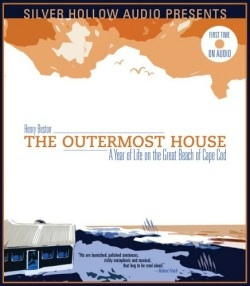
The Outermost House
A Year of Life on the Great Beach of Cape Cod
“Poetry is as necessary to comprehension as science,” wrote Henry Beston in this 1928 classic, which chronicles the austere year he spent contemplating the natural world from a small cabin on the outermost beach of Cape Cod. Although the book initially made waves (and subsequently influenced writers including Sylvia Plath and Rachel Carson), more recently it has been forgotten. Fortunately, this new audio recording reintroduces Beston, reminding us that poetry can indeed reveal as much about nature as science.
Beston initially anticipated living on the coast for a few weeks, but, as the seasons began to change, he found himself riveted by what he called the “elemental” forces—fire, water—of his remote and wild locale, and thus decided to stay on for a full year. During this time, he lived a solitary existence punctuated only by the occasional cup of coffee shared with the coast guards stationed nearby, and consequently, most of the “characters” that populate the book are of the feathered variety. Starlings and terns, plovers and warblers, sandpipers and gulls; the diversity of birds Beston encounters causes him in several places to lament it would be impossible to categorize them.
This is not to say The Outermost House will only interest the amateur ornithologist. Beston was a poet before he was a naturalist, and, as his biographer Daniel G. Payne comments in an informative interview on the last disk, Beston labored over his prose. Beston even refused to use a typewriter, because he believed the clacking of the keys would interfere with his ability to hear the rhythm of his sentences. This literary sensibility makes his work well-suited to an audio format, but unfortunately, in this case, the narrator, Brett Barry, sometimes comes across as mechanical in his attempts to enunciate precisely, too often rendering Beston’s work trite and outdated.
The Outermost House rises above this problem though, and the pertinence of Beston’s observations about the disconnection between humans and the nature soon becomes strikingly clear. Decades before the public was outraged by oil slicks, Beston mourned the impact of pollution on ocean life. He also worried about the ubiquity of electric lights, warning: “Our fantastic civilization has fallen out of touch with many aspects of nature, and with none more completely than with night…with lights and ever more lights, we drive the holiness and beauty of night back to the forests and the sea. Do [we] fear that vast serenity, the mystery of infinite space, the austerity of stars?” Beston raised these issues a century ago, and yet they and his other observations about nature still give pause, proving readers with a poetic reason to appreciate the beauty of nature.
Disclosure: This article is not an endorsement, but a review. The publisher of this book provided free copies of the book to have their book reviewed by a professional reviewer. No fee was paid by the publisher for this review. Foreword Reviews only recommends books that we love. Foreword Magazine, Inc. is disclosing this in accordance with the Federal Trade Commission’s 16 CFR, Part 255.
